Poor water quality poses a serious threat to Indian economy where over one lakh people die of water-borne diseases annually and majority of people have no access to safe drinking water. Several ministries have joined hands to address the major challenges like cleaning the Indian rivers, improving sanitary conditions for the rural and urban India, upgrading industrial and sewage waste management through initiatives like ‘Swachh Bharat Abhiyaan (Clean India Mission)” and “Smart Cities Mission’.
The Department of Science & Technology (DST) has developed knowledge network for evolving customized technological solutions for water challenges suited to specific social context and fulfill the goals of the National Water Mission of optimising water utilisation and increasing water use efficiency by 20%.
DST’s initiatives promote national and collaborative developmental research to address prevalent and emerging water challenges; capacity building of research professionals and water managers; evolve S&T based sustainable models with industry and recommend appropriate policy inputs. It also conducts techno- economic-social analysis of technologies and their suitability in specific context and upscales and replicates technologies and solutions to credible scale.
S&T interventions for safe, affordable drinking water
Water Technology Initiative promotes R&D activities for providing safe drinking water at affordable cost and in adequate quantity using appropriate Science and Technology interventions evolved through indigenous efforts. Since quality is the main consideration of safe drinking water, processes which imply nano-material and filtration technologies have been focused. The initiative also includes pilot testing of products and application of selected technologies.
Indo-UK Collaboration for water quality research
UK’s Natural Environment Research Council (NERC), Engineering and Physical Sciences Research Council (EPSRC), and India’ Department of Science and Technology (DST) are working on a joint programme (worth £8.4m) on Water Quality to improve the understanding of the transport, transformation, interactions and fate of natural and man-made pollutants in the environment and determine the risks they pose to people and the environment
They are also developing sensor based water quality monitoring for rivers and other water bodies. The programme also aims to explore the various water treatment technologies that could be used for sustainable recycling and reuse of water, trace elements and nutrients.
Real-time river water quality monitoring tech
In order to eliminate problems associated with manual water quality monitoring, DST and Intel have come together for developing state-of-art solutions for real-time river water quality monitoring. The goal of this research would be to enable the development and eventual deployment of low-cost, low-power, autonomous wireless sensor networks to provide a fine-grained view of several critical water and air quality metrics over large geographic areas in cities, riv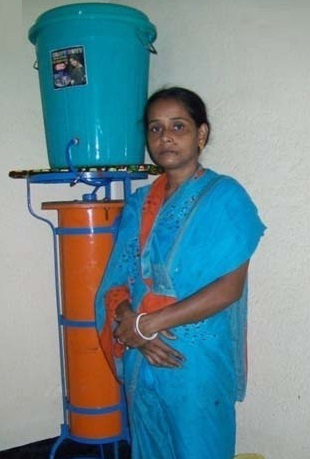 ers, watersheds and so on.
ers, watersheds and so on.
Laterite based Arsenic Removal Filters
The laterite based arsenic removal filters use naturally abundant raw laterite modified by suitable chemical treatment. The Laterite based Arsenic Removal Filters require no power for functioning and also easy maintenance. The adsorbent is cost effective and removes Arsenic, Iron and Bacteriological contamination. For reject management it has been ensured that spent media meet Toxicity Characteristics Leaching Protocol (TLCP).
The technology developed by IIT Kharagpur has been field tested and transferred to industry for commercialisation. Around 20 domestic filters (120 l/day capacity with 5 years life) and three community scale filters (500, 1500 and 800 l/day capacity with 5 years life) have been already deployed, catering to needs of 5000 people (cumulative basis). After 5 years, the filter bed needs to be replaced which cost only Rs. 500-800 (depending on capacity).The domestic filter does not require any power to operate and is entirely gravity driven. The community scale filter requires a pump to fill the overhead tank. Rest of the filtration mechanism is similar to the domestic filter.
A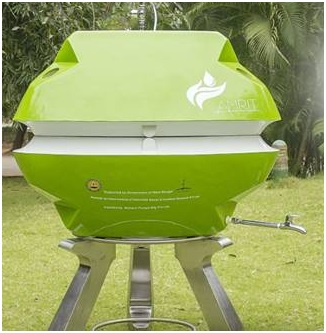 MRIT: Arsenic & Metal Removal by Indian Technology
MRIT: Arsenic & Metal Removal by Indian Technology
Arsenic & Metal Removal by Indian Technology (AMRIT) is an affordable solution for providing clean drinking water in arsenic affected areas. It is a gravity-fed water purification unit in which arsenic and iron containing water is passed through a composite filter unit to obtain water, conforming to international standards. The process of synthesis is exceptionally simple – it is prepared in a manner as nature prepares sea-shells, materials are made at room temperature in water, yet the materials are stable in water. These aspects make the innovation scientifically unique, green and sustainable.
It is one of the world’s best engineered Nano materials and has been developed by IIT Madras for water purification to provide global solution for most difficult water challenges. Perseverance of research group with sustained DST support led to this remarkable feat.
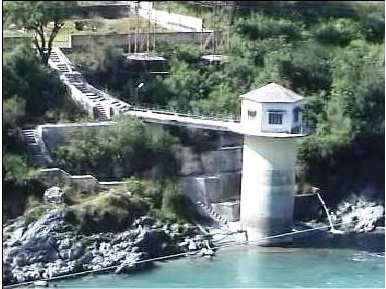 Technology for Filtration at River Bank in Uttarakhand
Technology for Filtration at River Bank in Uttarakhand
DST in partnership with Uttarakhand State S&T council and Uttarakhand Jal Sansthan has set up a cost effective sustainable River Bank Filtration System (10000-60000 lph) using natural aquifer material catering to a population of more than 60,000 people at Augustmuni, Karnaprayag, Satpuli, Srinagar and Gaucher.
The challenge was to tackle seasonal variation in water supply, avoid surface run-off due to geological terrain and address high turbidity and biological contamination. The intervention has resulted in increasing per capita water availability at affordable cost. The quality of water has also improved and users now only need to disinfect the water before filtrationas against coagulation and filtration along with disinfection, required previously.
Drinking water production requires minimal post treatment and costs less than Rs 2 per cubic meter. Riverbank filtration is providing drinking water for five clusters covering 61159 people at in Uttarakhand. The Technology has been developed and demonstrated in the field but not commercialised.
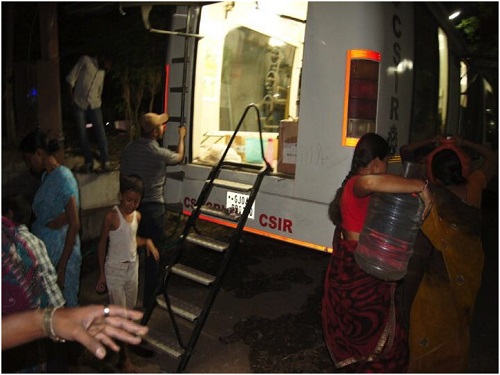 Mobile water purification deployment in drought hit region
Mobile water purification deployment in drought hit region
DST supported a quick deployment and demonstration of a mobile water purification unit developed by CSIR-CSMCRI for high recovery for producing portable water in drought prone Latur City. The mobile unit was stationed at a open source well with contaminated water in “Gorakshan” sanstha—in the heart of city with contaminated water.
This mobile unit was equipped with indigenously developed RO membrane technology capable of purifying and cleaning turbid/suspended particles as well as desalting excess unwanted dissolved contaminated salts including arsenic, fluoride and nitrate that could be present in that water and are harmful for human health. Through this deployment 40,000-50,000 liters of water per day water was made available and was distributed to the people.
The mobile RO unit was developed for demonstration of high recovery RO drinking water (90% desirable) considering feed water TDS < 2000 ppm to produce safe and clean water in Marathwada region facing scarcity of drinking water during the severe drought. The mobile unit was equipped with indigenously developed RO membrane technology capable of purifying and desalting excess unwanted dissolved contaminated salts in water which is harmful for health and for producing drinking water as per World Health Organisation (WHO) standards.
Low cost electrode tech for water purification
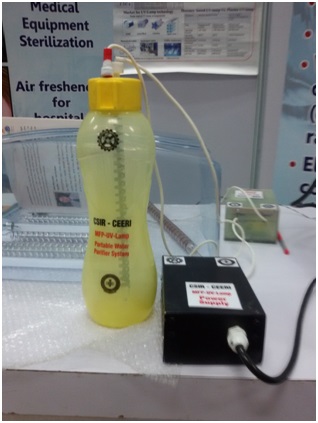 DST has supported a low cost technology which uses electrical discharge between two electrodes separated by an insulating dielectric barrier, for portable water purification. The technology is called dielectric barrier discharge (DBD) based plasma system. The technology has been developed and demonstrated in the field by CSIR - Central Salt and Marine Chemicals Research Institute based on a quick field survey done by ICT, Mumbai and successfully transferred to the industry for commercialisation.
DST has supported a low cost technology which uses electrical discharge between two electrodes separated by an insulating dielectric barrier, for portable water purification. The technology is called dielectric barrier discharge (DBD) based plasma system. The technology has been developed and demonstrated in the field by CSIR - Central Salt and Marine Chemicals Research Institute based on a quick field survey done by ICT, Mumbai and successfully transferred to the industry for commercialisation.
It provides smart solution systems for supply of potable water to the tune of 1–5 liters instantaneous water purifier system, 100–200 l/h and 200–500 l/h potable water treatment systems and 500–1000 l/h water ATMs. The ultimate implementation is to witness a smart water grid concept at CSIR-CEERI campus and installation of water ATMs at nearby adopted villages.
A controlled water flow arrangement has been made to test the deactivation efficiency of the Mercury-Free Plasma (MFP) UV-lamp in flowing water. It consists of a 24 DC /14 Amp diaphragm pump, a control system and water flow arrangement through a domestic water purifier housing in which conventional mercury based UV lamp has been replaced with the MFP-UV-lamp. This system is able to generate 250 ml/min. to 1600 ml/min. water flow in the domestic water purifier system.
The first-hand tests have been carried out at Birla Institute of Scientific Research, Jaipur, which has shown the percentage reduction in bacterial load of E. Coli bacteria of 105 dilutions by 97.79% for 250 ml/min water flow rate in an aluminum water container.Furthermore, no microbial growth was observed as the flow rate/min was reduced from 1600 ml/min to 250 ml/min for 105 dilutions.






























